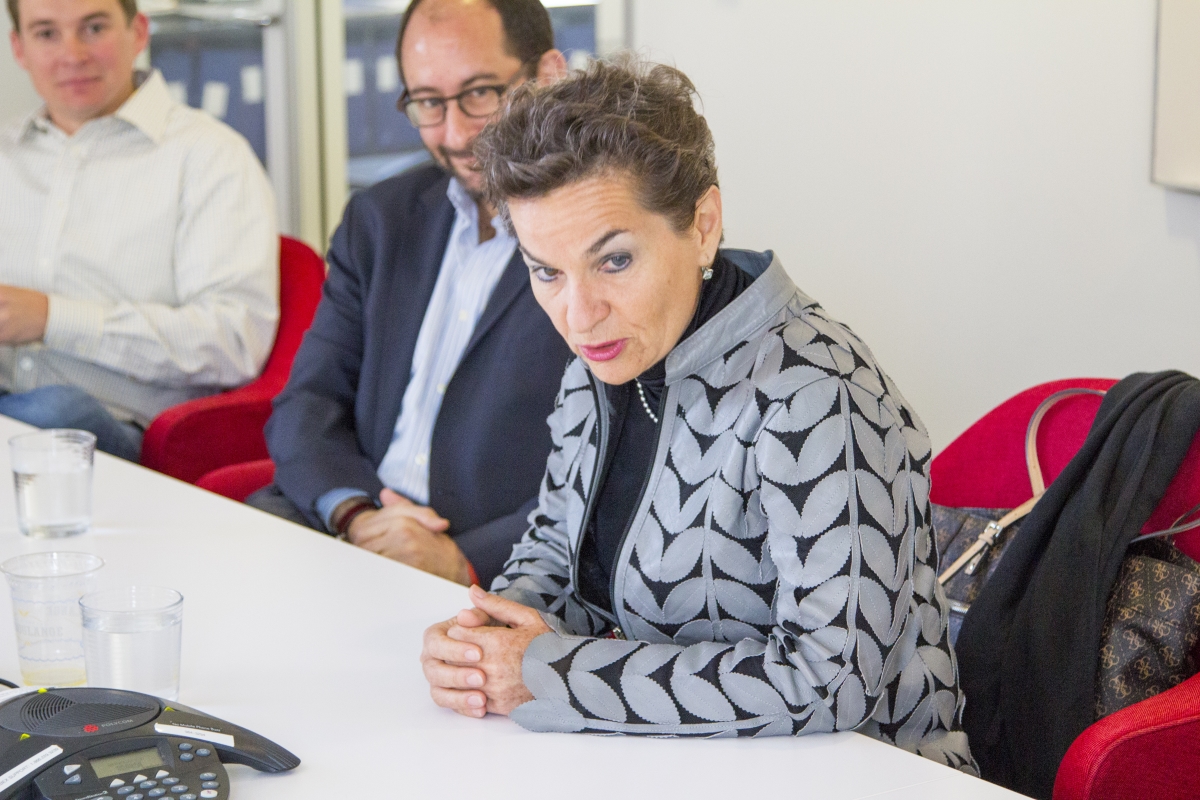Christiana Figueres to Business: Act on Climate Now (And Then Go to COP21 for the Party)
Eva Dienel
At a gathering of BSR member companies in our San Francisco office yesterday morning, the UN’s chief climate negotiator, Christiana Figueres, reached forward to bump up the volume on the speaker phone so that she could hear callers on the line. “Did that work?” she asked.
No matter that she is the executive secretary of the UN Framework Convention on Climate Change. She takes her own immediate action when it comes to tech support.
She is asking business to do the same when it comes to climate change.
“How many businesses actually take on their own low-carbon commitment?” she asked the group of representatives from about 10 BSR member companies, including Adobe, Autodesk, Gap, NRG Energy, and others. After ticking off a list of companies that have made internal commitments to 100 percent renewable energy, she laid out her challenge: “Every single fortune 500 company should be making exactly the same commitments. It’s not if, it’s how am I going to go 100 percent clean energy? Do it.”
In addition to making a commitment to 100 percent renewable energy, Figueres outlined three other ways for business to act: By using the voice of business leaders to advocate for what she described as a “new norm,” by influencing partners in their value chains, and by engaging in the policy process.
For companies planning to go to Paris in December to influence the agreement, she warned, “it’s too late.” “By the time we [negotiators] get on the flight, we have our position—we have our minimum and our maximum positions so we don’t have to call home,” she said. “If you’re going to COP for the party—for the purposes of being inspired and taking lessons home—fantastic.”
To have an impact, though, companies can start now where governments are starting, by “doing their homework,” as Figueres put it, to understand climate science and create meaningful plans for action that are relevant to their industry. “Your job is to begin to shift your companies into the new space,” she said. “We are moving into a low-carbon economy, with or without Paris.”
Figueres compared the UN negotiations process to a highway (albeit one made of something other than asphalt), with different lanes and different vehicles traveling at different speeds but all moving toward the same destination—carbon neutrality. “We have to get to that neutrality while housing, feeding, watering, and transporting 9 billion people. What that means is that we need to completely delink GDP and GHG,” she said, noting that last year was the first year global GDP went up while GHG remained flat.
This vision for change—sending growth upward while emissions spiral down—is why Figueres said we need a new normal. “Ten years from now, your companies need to look fundamentally different in the way you use, consume, and purchase because energy is at the bottom of everything you do,” she said.
In spite of the need for immediate, rapid change, Figueres is hopeful. She noted a number of developments since the Copenhagen climate change conference in 2009, including the fact that science is “so much more clear,” impacts that are “so much more painful,” and lower-cost technologies are so much more available. Policy has come along as well: In 2009, there were 40 pieces of climate-related legislation around the world; today, there are 800. Capital also has moved, with US$214 billion invested in renewable energy last year.
The biggest change since 2009 has been what Figueres described as a shift in thinking about climate change as a shared opportunity. “Before Copenhagen, it was all about burden share,” she said. “The blaming finger was about three feet long.” Turning to the group of business sustainability leaders, she added, “That conversation is beginning to shift, and I’m looking to you to accelerate that shift.”

